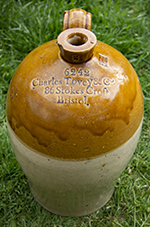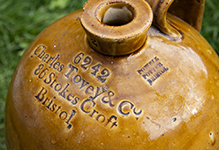

"2" on lip.
Potter: Powell / Potter / Bristol - Round bodied two tone glaze.
Charles Tovey was born on 4 April 1812, baptised at St. Peter's, Bristol, on 1 Jan. 1813, son of Samuel Griffiths Tovey and Mary Ann Moore. Charles married Mary Symons Simpson at Westbury upon Trym on 1 Sept. 1835. Mary was second daughter of Symons Simpson of Banwell in Somerset. Charles first advertisement appears in the Bristol Mercury, 29 Nov. 1834, where he is already in business as an importer of wines and spirits, with a great variety of stock in bonded cellars. In particular he notes that his white wines are in "white" (clear) glass bottles with clean white corks, as opposed to the black glass more commonly used at that period.
In 1837 Charles advertised his "FOREIGN
WINE HOUSE, 86, STOKE'S CROFT, BRISTOL.
MASDEU.— 28s. Per Doz. Cash
30s. Per Doz. Credit.
ROUSSILLON.— 27s. ditto ditto
28s. ditto ditto. Credit.
THE above FRENCH WINES are the genuine growth of the grape from the
Eastern Pyrenees (ci-devant Roussillon); the only distinction is,
the Masdeu takes its name from a Vineyard which belongs entirely and
exclusively to the Messrs. Durand, of Perpignan, from whom only it can be
obtained genuine. The Roussillon, though less in price, will perhaps be
preferred by the majority of consumers. CHARLES TOVEY claims the merit of
first importing this Wine into Bristol, since which time the increasing
demand and approval a surety of its excellence. One fact in regard to
these Wines is not to be overlooked, they possess only about 8 to 10 per
cent. of spirit, whilst the average of Peninsular Wines contain from 20 to
25 per cent.
PORT.—In the Cellars of this Establishment will be found every variety to
please the palate of the most fastidious, from the vintage of 1820 to that
of the not less celebrated 1834. Both the Ports and Sherries are shipped
by Houses whose names alone are guarantees of their qualities. CHARLES
TOVEY has, in Bond (shipped expressly for the Connoisseur), a few
Quarter-Casks of extraordinary Old Port, and Quarter-Casks and Barrels (14
Gallons each) of very superior Sherry, Brown, Golden, and Pale colours,
which, for quality and price, cannot be surpassed.
MARSALA BRONTI.—The sale of this Wine still increases; and the Proprietor
is enabled, from his extensive stock, to offer it at prices that must
command a continuance.
First-Class, exceedingly fine - - 26s. per
Doz.
Second-Class, general quality - - 24s. ditto.,
A great quantity of Quarter-Cask, 21 to 28 Gallons each.
CAPE MADEIRA, of the first quality, is to be obtained here at 18s. Per
Dozen. The itinerant practice of calling upon Gentlemen to solicit their
Orders is not pursued by CHARLES TOVEY, but Samples of any Wines or
Spirits are sent, free of expence, to any parties requiring them.
SPIRITS.— Spirits may be obtained at this Establishment, of the First
Quality only. There is very little mystery in selling Spirits at low
prices: CHARLES TOVEY is determined never to sacrifice Quality to Price
and his Friends and the Public may depend upon being supplied with the
best that can be obtained. There is no dram shop connected with the
premises, and the lowest quantity of Spirits retailed is one Pint.
FOREIGN WINE HOUSE, 86, Stoke's Croft."
Charles died on 1 June 1888 at 2 Royal York Crescent. At the time he also had a property at 14 Walpole Terrace, Brighton.He was interred at Clifton Parish Church.
From the Western Daily Press - Saturday 02
June 1888 p. 3:
"DEATH OF CHARLES TOVEY. We regret announce the death of Mr Charles Tovey, yesterday morning, at his residence, 2, Royal York Crescent, Clifton. Though Mr. Tovey from advancing years did not lately take any part public affairs, he formerly occupied a prominent position, in respect to civic matters. He was the son of Mr. G. Tovey, of Bristol, and was born in 1814 (sic).
The deceased married in 1835, Mary Symons, daughter of Mr. Symons Sympson, of Banwell, Somerset, by whom he had large family, and five sons and three daughters survive him. Mr. Tovey, in his early years, associated in business with his father, who was connected with an eminent firm of Bristol distillers, and in 1834 he commenced business on his own account in premises belonging his father, in Stokes Croft, which remained in his hands until his death.
In 1846, owing to the then declining shipping trade of the port of Bristol, and prohibitive duties levied on the import of general articles of commerce, and on all shipping inward by Bristol Dock Company, in order to declare a dividend, a "Free Port Association" was formed, of which Mr Tovey was an active member, and owing to the exertions the Association, the docks were, in 1849, transferred to the city. In 1846, Tovey was unanimously elected Town Councillor for the ward of St. Paul, and was afterwards returned no fewer than seven times consecutively.
He deserves to be remembered with gratitude by Bristolians on account of his exertions to have the position of the Library Society towards the city investigated; and the result his labours somewhat surprised those who paid little attention to the claims which the Corporation had upon what was long considered private property. A volume written Mr. Tovey disclosed the circumstances under which, in 1613, building in King Street was given to the Corporation by Robert Redwood for the purpose of being converted into library for use of the citizens. Tobias Matthew and Richard Vickris, by bequests, added to the value of original gift, and in 1740 a building was erected by the Corporation.
Twenty-six years afterwards about 1,400 books were bequeathed tor use the inhabitants of Bristol by John Heybyn, and thus a free public library of considerable value was formed. A few years later a subscription library was set on foot by certain gentlemen who urged the Corporation to allow them the use the library house and the literary treasures therein deposited.
The Town Council of that date was scarcely alive to its responsibilities, and not only ignored the rights of the citizens by acceding to the request, but went to the expense of having the building renovated, and paying portion of the librarian's salary. At subsequent periods the society, who had organised the subscription library, were furnished with funds out of the city treasury, and so thoroughly did the members regard the property as their own that they applied to the Council for leave to remove the city books tho shelves in order to make room for the volumes of the society.
An attempt was made rather more than 50 years ago have the rights of citizens determined, but to no practical effect. In 1848 Mr. Tovey applied the Corporation to give the society notice quit the premises in order that they might be turned to their original purposes. The proposition was adopted in early part the year 1854, and the society, though at first indignant at this interference with what they had come to regard as their rights, at length saw fit to yield, and leaving behind them the 2,000 volumes belonging to the city, removed premises to the top of Park Street.
In 1854, Mr. Tovey was elected Governor of the Incorporation the Poor, in whose hands the relief and control of the poor at that time absolutely rested.
Mr. Tovey was the author of several works, his first being one entitled "The Bristol City Library, its founders and benefactors" which passed through more than one edition. In 1861, Mr. Tovey embodied technical knowledge gained during studies at home and travels abroad in an interesting work called "Wine and Wine Countries," to which the press and public generally gave hearty welcome. The practical information respecting wine countries and the preparation and properties of the various kinds of wine contained in this work called for a new and enlarged edition in 1877, and this obtained a wide circulation. Ia the following year Mr. Tovey published "Wit, Wisdom, and Knowledge distilled from Bacchus," which treated the same subject, but from a lighter point view.
Mr. Tovey, who displayed great love of music from his yonth upwards, was the first elected member the Bristol Madrigal Society, in 1837. He was not only a vice president, but "father of the society," and during more than 50 years missed but few rehearsals. Mr. Tovey was for many years a member of Archaeological Society, generally attending the. annual congress meetings, and was likewise a fellow of the Royal Historical Society.
His pen and his purse were ever ready in promoting welfare of his fellow citizens, though for the last few year he had been in failing health and struggling with decreasing power, which compelled him to withdraw from active life. Nevertheless, with the indomitable perseverance so natural to him he kept up to the last, and was interested in all that concerned his native city, so that may be truly said to have died literally in harness. At the parliamentary election 1875 he acted as chairman of the committee formed to promote the candidature of the late Mr E. S. Robinson."
| 2 Gallon Stoneware Flagon |   |
| Impressed:
6242 / Charles Tovey & Co. / 86 Stokes Croft / Bristol "2" on lip. Potter: Powell / Potter / Bristol - Round bodied two tone glaze. |